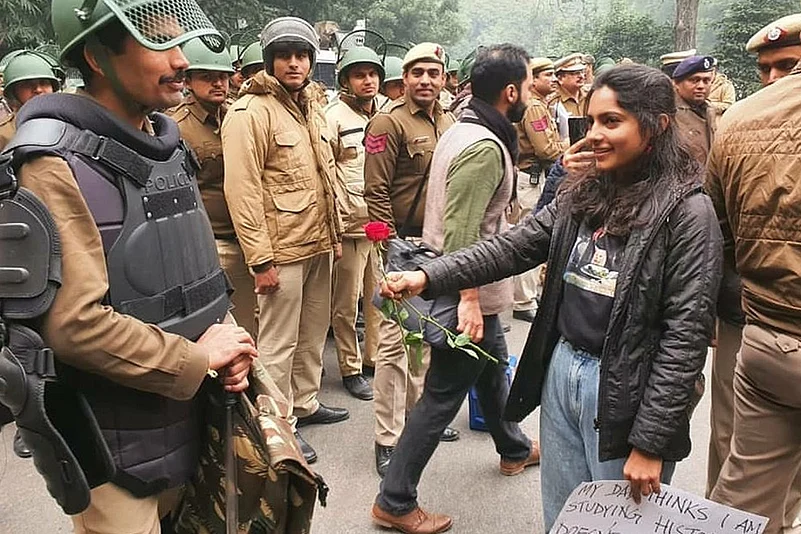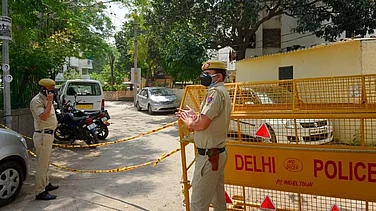The photo of a student protestor, Shreya Priyam Roy, offering a red rose to a heavily armed and armored Delhi policeman has gone viral on social media.
“I offered roses to policemen because be it JNU, Jamia, DU, AMU or Assam, they have beaten up students mercilessly everywhere,” Roy told The Hindu. “I wanted them to know that students are not violent, we are opposing government policies in a peaceful way.”
In the face of police violence against the CAA-NRC protests, many students have offered roses, sung songs and recited poems. Before guns, teargas and batons, the most stirring image of student protests has taken the shape and texture of humane beauty: shayari, ghazals, imaginative posters and slogans of every kind, not without the art of scathing satire.
Meanwhile, the death toll from the protests has climbed to double digits in Uttar Pradesh alone. The figure includes children.
The gesture of the smiling young woman offering a rose is a powerful symbol today in the violent country called India.
It sends a textured signal – one of intense, ethical intricacy at once -- from two social groups that have been subjected to much violence in our nation. Two communities, two very different kinds of violence.
For many, India has now established itself as “no country for women,” as captured in the title of journalist Priyanka Dubey’s haunting book on gang rapes of poor and marginalised women across the nation. The recent brutal gang rape and murder of the 26-year old veterinarian in Hyderabad has cut open the nation’s wounded memory of the rape-and-murder committed in south Delhi seven years ago.
Suddenly, it has pushed people to cast away the name the nation gave the victim at that time, “Nirbhaya,” the fearless, shedding the romance of courage people desperately needed to construct around her in the face of the horror.
The other community is that of students in universities across the nation, who have been subjected to ideological and physical violence of the most toxic kind. As I wrote in this column last week, this ideological violence has a phalanx of reasons behind it that has radiated around universities like JNU, Jadavpur, Hyderabad, and now around Jamia.
Students have responded to this in various ways, occasionally with reciprocal violence. But the most powerful response to police onslaught, one rapidly becoming the central symbol of student resistance, has emerged out of humanity and beauty: flowers, songs, skits, biting and playful words and artwork. This is the true legacy of Gandhian resistance, civil disobedience re-imagined in stirringly aesthetic language.
Early in the 20th century a writer named Virginia Woolf sat down to write a series of letters to an imaginary man. They were, she said, the response of an educated woman to an educated man – to his question on how, in her opinion, war might be prevented. “But one does not like to leave so remarkable a letter as yours” -- “a letter perhaps unique in the history of human correspondence, since when before has an educated man asked a woman how in her opinion war can be prevented? — unanswered,” she wrote.
The series of letters made up the book Three Guineas, one of the most powerful pieces of literary polemic ever created. It addressed the heavily militarised, hyper-masculine public sphere of fascist Europe, with the plea to remake it in the image of a deeply humane, feminine private sphere.
Roy may or may not have planned her gesture this way. But history will read her offer of the rose to the heavily armed policeman in the same spirit. While a toxically masculinised, anti-education alliance unleashes violence on unarmed bodies of student and civilian protestors, the most powerful answers will come from music, flowers, poetry and silence.
Do take a look at the face of the policeman who is being offered the rose. Under the combat helmet, there is a smile. Under the smile, there is shame. His comrades stare at him in wonder. Love has a way of making you blush. At the turning points of history, that blush is a blush of shame.
(A novelist and scholar, Saikat Majumdar is Professor of English & Creative Writing at Ashoka University. @_saikatmajumdar. Views expressed are personal)
















